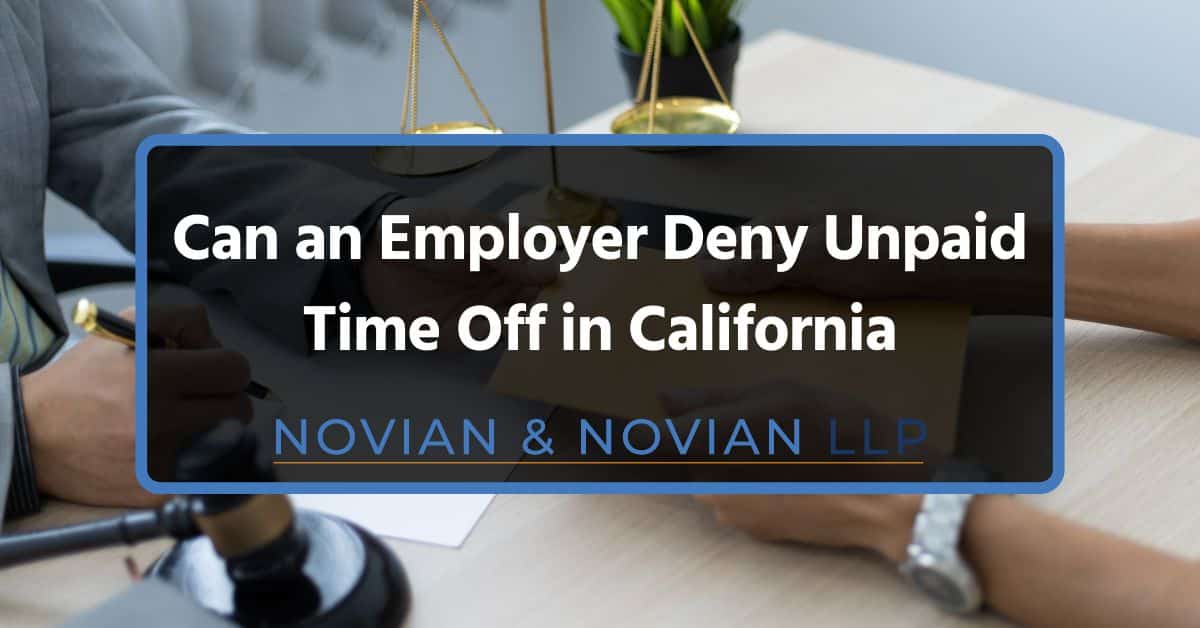
by | Mar 21, 2024 | Employment Law
Can an employer deny you unpaid Time off in California? As employers, you aren’t required by law to give employees paid or unpaid vacation time. California considers Vacation as earned wages, so as employees work, they accumulate vacation days.
Under which circumstances can an employer deny unpaid time off in California? Laws related to unpaid leave fall under The California Family Rights Act (CFRA) or The Federal Family and Medical Leave Act (FMLA). If paid time off is denied under FMLA or CFRA, the denied worker can file a complaint with the DFEH (Department of Fair Employment and Housing) up to three years after the unlawful denial.
In these cases, the employer may need to pay the employee, who is eligible for lost wages, possible job reinstatement, emotional distress damages, financial damage reimbursement as a result of the denial, interest in lost wages, and other compensation.
Our expert Employer Defense Lawyers at Novian & Novian understand the nuances of California Employment law. With over 35 years of experience, our attorneys are ready to help employers navigate labor law-related questions and offer Business Litigation & Dispute Resolution, when necessary.
Contact us today to learn more.
In this article, we delve deeper into the robust employment laws of California. the possible repercussions of denying unpaid time, and how employers can navigate the statements of this federal law efficiently.
Can Employers Deny Unpaid Time Off?
The short answer is yes. Employers aren’t required by law to give their employees paid or unpaid leave. They may offer paid vacation, but these days, they are considered earned wages, accumulating as the employees work.
Employers are only required to grant time off for eligible employees if they request time off for CFRA or FMLA-covered reasons. California laws clearly state that under these circumstances, employers are legally required to grant them paid sick leave or time off.
To be more precise, they may be the following:
- A severe health condition that makes the employee unable to do their job.
- A serious health problem that makes employees unable to perform their jobs due to work-related injury or illness.
- Having to care for a child, parent, or spouse with a severe health problem.
- Birth parent bonding.
- Bonding for foster non-birth parents, adoption/foster placement
- A qualifying circumstance arises from a spouse, child, or parent being a military member on active duty or called to active duty status.
That said, employers may also deny unpaid time off if the nature of the request doesn’t correspond with the reasons detailed in the FMLA or CFRA, like addressing business needs. The employer may also deny the request if the employee gives insufficient notice, wants to take too much time off, or doesn’t have any valid reasons.
Legal Grounds for Denial
Denying Unpaid Time Off
Can an employer deny unpaid time off? California federal law states that employers should not interfere with time off requests that fall under the California Family Rights Act. or the FMLA, as it may result in penalties. Still, the employer may deny the demand if the employee cannot provide valid reasons for their unpaid leave request or has given only short notice.
Denying Paid Time Off
Employers can deny employees requests for accrued paid time off, but the employer must provide a valid reason or argument for the response. For example, suppose an eligible employee hasn’t scheduled their accrued paid time off in accordance with the employer’s policy. For instance, they forgot to obtain consent from their manager/supervisor. In that case, the employer may legally deny the vacation request, even though it can be disappointing and frustrating for the employee.
Employers can also limit how many vacation days employees can earn, and when someone leaves the job, they have to pay out any unused vacation days. The state Labor Commissioner makes sure vacation policies are fair for everyone.
Employer’s Rights and Obligations
First, time off in California isn’t mandatory by the California Labor Code. Still, the majority of employers provide paid time off (PTO) as a benefit or perk.
Employers who do implement a PTO policy have the right to the following:
- Policy Establishment & Enforcement: The employer has the right to establish a company policy and other documents that provide employees with the necessary information about the nuances of the policy. The document should describe how employees should request unpaid time off and PTO and should highlight cases that fall under the California Family Rights Act and other similar legal documents that also deal with paid sick leave, etc.
- Documenting All Unpaid Leave and Paid Leave Requests: Employers should document all these requests. This documentation can include the date of the request, the reason for the request, and whether it was approved or denied.
- Compliance With Labor Laws: An experienced employment lawyer may help ensure that the company policy complies with California law pertaining to sick leave, family leave, and other protected time off.
- Communicating Policy and Labor Law: Employers also have the right to speak their unpaid time off policies to employees, including through employee handbooks or other written materials. This helps employees understand their rights and responsibilities regarding time off requests.
Consequences of Unlawfully Denying Unpaid Time Off
Employers are responsible for evaluating all paid time off (PTO) and unpaid leave requests and determining the circumstances covered by the FMLA or CFRA. For example, California’s Medical Leave Act requires employers to grant up to twelve weeks (or up to four months) of unpaid leave in the following cases:
- When a family member is recovering from an illness or requires assistance.
- Family reasons, like caring for a registered domestic partner.
- Military service or a family member’s military service.
- Bonding with a new child (newborn) in the case of a new parent.
If the reasons aren’t covered in these acts, the company isn’t required to give a green light to the request for several weeks of unpaid leave.
Potential Legal Repercussions of Denying Unpaid Leave Requests
The repercussions for denying unpaid leave will depend on the reason for the denial and the surrounding circumstances.
Legal Compliance
First, employers must ensure that the denial didn’t violate labor laws such as FMLA or CFRA and that the employee has no legal grounds to file claims that may result in a lawsuit.
Those employees who have been denied their requests that are covered under the pertaining medical leave act have legal grounds to take action and file complaints with the California Labor Comissioner’s Office or turn to civil litigation to pursue legal remedies.
Specifically, if the employer is liable for denying paid family leave or violates the Parent Leave Act, they may be required to:
- Cover the damages, losses, or injuries that the employee suffered. This includes front and back pay for lost future wages, if applicable,
- California laws also require the employer to pay compensatory damages for embarrassment, suffering, pain, and humiliation,
- Pay attorney fees and punitive damages.
- Implementing adequate training for supervisors, managers, and employees in handling internal grievances and the FEHA (Fair Employment and Housing Act)
Brock vs. Amazon: A Case of Labor Law Violation
Take the case of Scott Brock from Bakersfield, CA, whose position at Amazon was terminated after he was denied unpaid leave after his parents passed away.
The employer violated both the CFRA and the Assembly Bill 1949 but still argued that Brock’s position was terminated because he threatened a co-worker and violated the workplace conduct policy at Amazon.
Still, Brock was eligible for unpaid leave, according to the lawsuit, at least 1,250 hours in the 12 months before the tragedy.
Brock was seeking damages of over $500,000 at the time, according to their lawyer, Ronald L. Zambrano, for emotional distress, lost wages, and punitive damages.
This wasn’t the first time Amazon had to deal with similar cases. Only two years before, a Santa Ana woman won $300,000 in court after the jury found she was a target of disparate treatment at her HR job at Amazon. Later, the court granted a total of $2.47 million in attorney’s fees to Thu Ngyyet Thi Tran, who stated that her supervisors dismissed her accommodation request while dealing with pregnancy-related morning sickness.
Working with a seasoned employment law attorney may help remedy such situations. Many employers have found that working with an expert can help them settle a claim before it reaches court.
On that note, the average cost to defend an employment lawsuit in an out-of-court settlement hovers at $75,000, but the expenses add up if the court is involved, with an average of $125,000.
When The Employer Denies Leave for Family and Medical Reasons: Impact on Employee Relations
Under certain circumstances, it is perfectly legal for the employer to deny vacation days. However, by denying leave when a family member is ill or in other law-covered instances, the employer may face different problems apart from just legal action.
Denial of medical leave, for example, may result in declined workplace morale, and employees may feel unsupported and undervalued, leading to decreased motivation and productivity. Denial in the case of a military family or the deteriorating health condition of an employee can also negatively affect employee detention. It may cause additional problems with high turnover rates, which can negatively affect the efficiency of the employer’s business, potentially hurting even their bottom line.
On that note, high employee turnover rates can inflict significant financial strain on a business. According to a nationwide estimate from the Small Business Administration, hiring someone new may cost 1.2 to 1.4 times their pay.
By comparison, according to the California Bureau of Labor Statistics, in the month of January 2024 alone, there were 8.9 million job openings, while separations and quits reached 3.4 million. While it is evident that not all of these quits and separations were due to the employer denying unpaid leave, it points to a negative and costly trend in the California labor market.
Types of Unpaid Time Off
In California, unpaid time off means periods when the employee neither performs their job nor receives payment. This can happen if they have already used their leave benefits or need to leave work for other reasons, such as health complications.
- Medical Leave: According to the CFRA and FMLA, employees have the legal right to take up to 12 weeks of unpaid leave to deal with an existing health condition to care for a new child or family member.
- Disciplinary Suspensions: in cases of sexual assault and domestic violence, the employer may suspend the employee without pay as a disciplinary action.
- Personal Leave: Personal reasons may also grant employees the right to take unpaid time off, but these need employer approval.
- Non vs. Exempt Employees: Employers won’t pay workers who are paid hourly for the time they do not work.
Instances Where Unpaid Time Off May Be Denied
While the pertaining state law gives clear guidance about handling paid vs. unpaid time off, employers can deny requests for unpaid time off in certain situations:
- Business needs
- Insufficient notice
- Based on the duration frequency of the leave
- The request doesn’t comply with the company’s policy
- Lack of valid reasons
- Taking too much time off
- Staffing issues
- Ineligibility for FMLA or CFRA-protected leave
- Performance concerns
Best Practices for Handling Unpaid Time Off Requests
In order to steer clear of possible law violations and the negative implications of denying paid or unpaid leave, employers should aim to develop a clear time-off policy that addresses both paid and unpaid leave.
Here are some recommendations:
Clearly Define The Criteria for Eligibility: Create an outline in accordance with accrued wages and other factors, such as years spent in the company, employment status, etc.
Establish a Clear Request Procedure: Be transparent about requesting time off, such as request submission times.
Be Specific About Unpaid Time Off: Clearly state the permissible reasons for requesting unpaid time off, such as personal illness, family emergencies, or other compelling circumstances.
Ensure Compliance: Ensure your policy complies with The CFRA and FMLA.
Communicate Expectations and Restrictions: Establish the limits of unpaid leave employees may take and address your expectations regarding attendance and absence notification; also, be clear about potential write-ups.
Give Room for Employees: Develop a strategy that enables your employees to address any concerns related to your policy.
Create the necessary documentation so your managers, supervisors, and employees can refer to it if necessary. Also, adequate training should be provided to supervisors and managers on effectively implementing and administering the unpaid time off policy, including handling requests and ensuring compliance with legal requirements.
Also, it is recommended that labor laws be actively researched and that conferences in Los Angeles be attended to learn more about this evolving topic. For example, The Labor Arbitration Institute regularly hosts conferences across the nation. Try and attend one of their conferences in LA. You should also take a closer look at the California Employment Lawyers Association’s upcoming events if you want to stay on top of labor and employment laws.
Conclusion
Employers may deny unpaid time off in California. Still, the reasons for the denial should be valid and not violate the FMLA or CFRA because then employees may take legal action.
As such, employers are advised to closely examine The Family Rights Act (CFRA) and The Federal Family and Medical Leave Act (FMLA) to avoid violations. On a similar note, unpaid leave requests that aren’t covered in the two acts should also be closely examined to foster a positive work environment and avoid potential legal problems.
To ensure that you and your pertaining policy are up to date with California labor laws, consult with our expert employer defense lawyers.
If you are currently facing legal issues regarding leave request denials, contact our business litigation and dispute resolution experts. Our lawyers have extensive experience and a proven track record of success navigating complex legal matters related to leave request denials. Rest assured that our team will handle your case with the utmost care, diligence, and expertise, ensuring your legal needs are met effectively and professionally.
Contact Us
Have questions about this post? Novian & Novian is a full service law firm in Los Angeles with clients that span the country. Contact us today for a free consultation.
Contact Us
Have questions about this post? Novian & Novian is a full service law firm in Los Angeles with clients that span the country. Contact us today for a free consultation.







